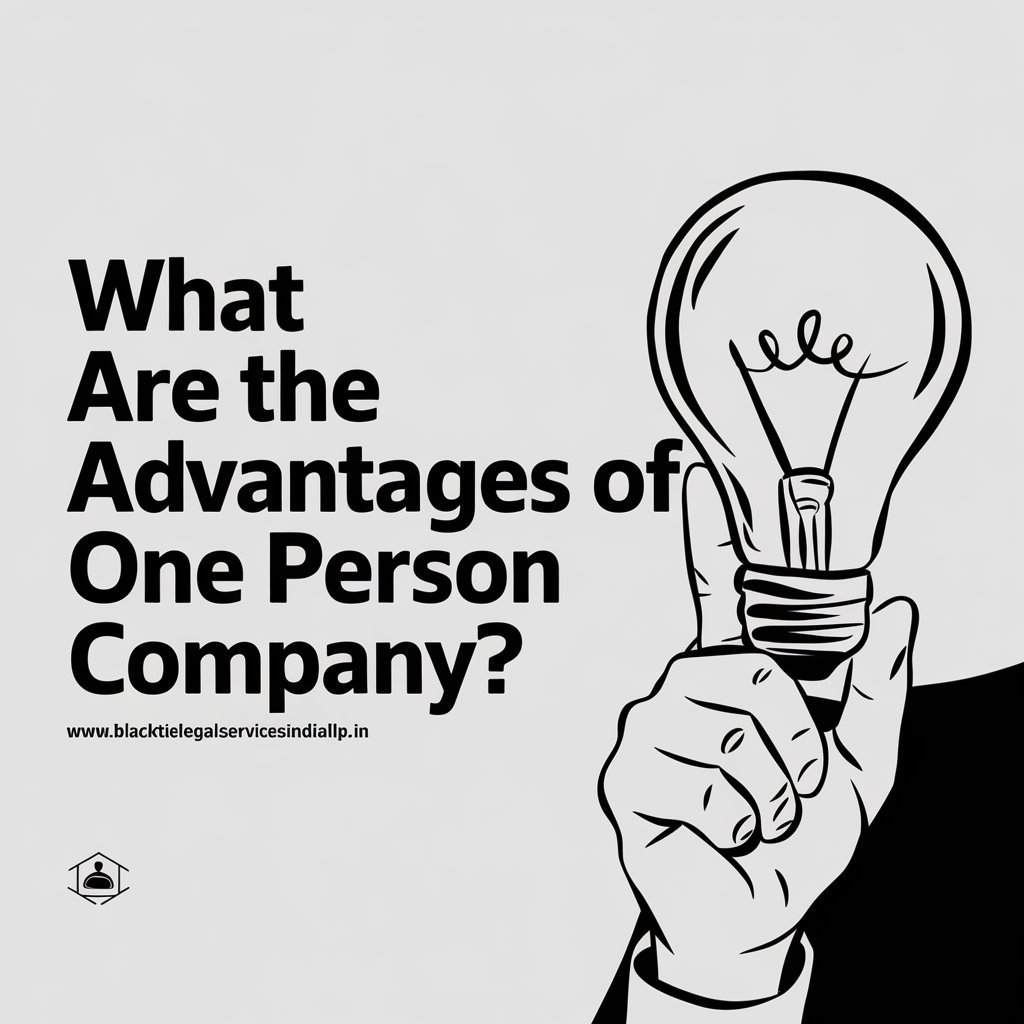The idea of starting and running a business is growing rapidly in India, and most people want to adopt ways in which they can operate companies legally and with less risk. The Companies Act, 2013 brought a new concept in the corporate sector by introducing One Person Company (OPC).
It offers combined benefits for a business entity and operates like a sole trader business. It provides a way through which aspiring businessmen can get into business with limited risk by offering limited liability and other benefits related to incorporation.
In this blog, we will go ahead and examine the Top 20 Best features of One Person Company (OPC) in great detail and clearly explain why it is ideal for individual business owners who want to gain credibility without any stress.
- What is the One Person Company?
- What are the Top 20 Features of One Person Company?
- Single Shareholder
- Limited Liability
- Separate Legal Entity
- Minimum Paid-Up Capital
- Single Director
- Nominee Requirement
- Perpetual Succession
- Ease of Incorporation
- Annual Compliance Requirements
- Restrictions on Conversion
- No Access to Equity Funding
- Lower Tax Benefits
- Flexibility in Management
- Regulatory Exemptions
- Suitable for Startups and Small Businesses
- Single Owner’s Complete Control
- Easy Ownership Transfer
- Limited Regulatory Restrictions
- Exemption from Mandatory Rotation of Auditors
- Enhanced Credibility
- What are the Advantages of One Person Company?
- In Conclusion
- FAQs
What is the One Person Company?

One Person Company is a new form of business entity in India where a single person can set up a company and be the sole owner and the sole member of the company. Introduced by the Companies Act 2013, OPC is simply a model of sole proprietorship business with the status of a legal entity.
If you want to know more about the one person company then you can click on the below video:
What are the Top 20 Features of One Person Company?

We have mentioned all the top 20 features of one person company in a very good manner in front of you all below and also given its complete information in a brief manner below it.
- Single Shareholder
- Limited Liability
- Separate Legal Entity
- Minimum Paid-Up Capital
- Single Director
- Nominee Requirement
- Perpetual Succession
- Ease of Incorporation
- Annual Compliance Requirements
- Restrictions on Conversion
- No Access to Equity Funding
- Lower Tax Benefits
- Flexibility in Management
- Regulatory Exemptions
- Suitable for Startups and Small Businesses
- Single Owner’s Complete Control
- Easy Ownership Transfer
- Limited Regulatory Restrictions
- Exemption from Mandatory Rotation of Auditors
- Enhanced Credibility
Single Shareholder
The special rule of a one person company is that such a company can be formed and run by one person. This person controls all the shares of this company and, therefore, takes all the decisions related to it. One good thing about it is that there is no need to have more than one shareholder or partner, which makes it ideal for those who run their business alone.
Single Shareholder is the 1st feature among the Top 20 Features of One Person Company and also a very important one.
Limited Liability
As per the rules of incorporation, an OPC provides its shareholder with the ability to operate under limited liability; thus, the shareholder’s assets are protected in case of organizational losses.
Unlike a sole trader, where all assets owned by the trader are exposed to business risks, an OPC ensures that the businessman’s liability does not exceed the amount invested in the business.
Limited Liability is the 2nd feature among the Top 20 Features of One Person Company and also a very important one.
Separate Legal Entity
An OPC can be legally owned, and this is done by an individual, but an OPC is set up separately with its own legal personality. This means that company law allows a company to acquire assets such as property and sign agreements, as well as sue or be sued in the name of the business.
The first gives the owner a sense of security, and the second guarantees the professional competence of the firm.
Separate Legal Entity is the 3rd feature among the Top 20 Features of One Person Company and also a very important one.
Minimum Paid-Up Capital
When registering an OPC, there is no requirement for any minimum paid-up capital. The advantage of this is that it allows entrepreneurs to start a business with the capital of their choice, thereby lowering the barrier to entry for small business.
Minimum Paid-Up Capital is the 4th feature among the Top 20 Features of One Person Company and also a very important one.
Single Director
Every OPC must have a director who can be a natural person who owns the company. However, an OPC can nominate up to 15 directors to conduct the business affairs of the company. This makes diversity possible in terms of managerial hierarchical formation as well as ownership held by the owner.
Single Director is the 5th feature among the Top 20 Features of One Person Company and also a very important one.
Nominee Requirement
Another condition for an OPC is that it is necessary to appoint a person who will manage the company after the owner’s death or inability to manage the business. This arrangement must be voluntary, and the nominee must sign a written consent for such an agreement. This keeps the business running and active, thereby minimizing disruptions in operations.
Nominee Requirement is the 6th feature among the Top 20 Features of One Person Company and also a very important one.
Perpetual Succession
Even though there is only one shareholder, and such person is the owner of the business, the One Person Company has a permanent business and does not come to an end when one shareholder dies or becomes incapacitated. The nominee appointed during the registration process takes control for the purpose of continuing the existence of the company.
Perpetual Succession is the 7th feature among the Top 20 Features of One Person Company and also a very important one.
Ease of Incorporation
The guidelines to be followed while incorporating an OPC are easy to follow. The person is required to fulfil fewer conditions than other types of businesses by law. It requires fewer papers to be submitted and certain legal requirements to be fulfilled, making the registration process easier for those entering the business.
Ease of Incorporation is the 8th feature among the Top 20 Features of One Person Company and also a very important one.
Annual Compliance Requirements
Despite having lighter rules than private limited companies, OPCs have to file annual returns, maintain statutory books of accounts and go for audits if required. However, shareholder companies are exempted from holding their Annual General Meetings (AGM), thereby saving time.
Annual Compliance Requirements is the 9th feature among the Top 20 Features of One Person Company and also a very important one.
Restrictions on Conversion
For proprietorship, a one-person company cannot always continue its operations as an OPC. An OPC has to convert into either a private limited company or a public limited company where the paid-up share capital is more than ₹50 lakh, or the annual turnover is more than ₹2 crore. This means that as the business expands, there is a possibility that it converts to suit its operations better.
Restrictions on Conversion is the 10th feature among the Top 20 Features of One Person Company and also a very important one.
No Access to Equity Funding
Listing status means that OPCs cannot offer their shares directly to the public and thus their power to seek equity financing is limited. This can limit its growth prospects, especially for those with high growth volumes, which is an important feature of some industries. External financing is not used and hence the owner has to use cash or debt capital to meet his needs.
No Access to Equity Funding is the 11th feature among the Top 20 Features of One Person Company and also a very important one.
Lower Tax Benefits
Related to other company formations like partnerships or LLPs (limited liability partnerships), OPC formations may lower tax benefits. Since it is considered a taxable entity like a private limited company, it may not have as many tax exemptions or benefits as other structures would, especially for a smaller business.
Lower Tax Benefits is the 12th feature among the Top 20 Features of One Person Company and also a very important one.
Flexibility in Management
The owner of an OPC also gets flexibility in management as the company is not bound to hold multiple board meetings and shareholder meetings. This reduces time and simplifies the organization processes while making it easier for the owner to manage the company without any external interference.
Flexibility in Management is the 13th feature among the Top 20 Features of One Person Company and also a very important one.
Regulatory Exemptions
The Companies Act 2013 provides certain legal benefits to OPCs which include fewer reporting requirements, OPCs are not bound to hold board meetings, and OPCs are not subject to certain compliances that are required for private limited companies. This reduces the time spent in managing an OPC and allows more focus on business processes.
Regulatory Exemptions is the 14th feature among the Top 20 Features of One Person Company and also a very important one.
Suitable for Startups and Small Businesses
One Person Company is suitable for new business ventures, one man or woman businesses, self-employed individuals, freelancers and small business individuals who want to enjoy the benefits of a corporate form of business without feeling the burden of a large corporate entity. It provides a good opportunity to start businesses and grow them slowly and then move to a larger scale when required.
Suitable for Startups and Small Businesses is the 15th feature among the Top 20 Features of One Person Company and also a very important one.
Single Owner’s Complete Control
In an OPC, there is only one member and hence, a single person exercises all the controlling power of the business. Due to this, it is possible to make quick decisions without the approval of partners and shareholders. This means that the owner can decide where he wants to take the business without worrying about anyone else.
Single Owner’s Complete Control is the 16th feature among the Top 20 Features of One Person Company and also a very important one.
Easy Ownership Transfer
The transfer of ownership in an OPC is not as complicated as any other normal structure of business. Unlike partnership and sole proprietorship businesses, the shareholder is free to sell his shares to a nominee or any other individual. This provides flexibility in organizational succession planning.
Easy Ownership Transfer is the 17th feature among the Top 20 Features of One Person Company and also a very important one.
Limited Regulatory Restrictions
OPCs are also somewhat less restricted by law than large companies and, hence, are good for individual business people. There are no much compliance issues, which includes few board meetings, less paperwork and others which reduce the burden on the owner’s time and money.
Limited Regulatory Restrictions is the 18th feature among the Top 20 Features of One Person Company and also a very important one.
Exemption from Mandatory Rotation of Auditors
When it comes to auditors, OPCs do not have to rotate their auditors, unlike other types of companies. This arrangement makes it possible for the owner to spend as much time as possible with the auditor and makes the audit easier.
Exemption from Mandatory Rotation of Auditors is the 19th feature among the Top 20 Features of One Person Company and also a very important one.
Enhanced Credibility
Since operating as an OPC gives a professional approach to the business, it improves the company’s image among its customers, suppliers and potential investors. Having a separate legal status is more respectable, even if this status involves only one member, than operating as an individual entrepreneur.
Enhanced Credibility is the 20th feature among the Top 20 Features of One Person Company and also a very important one.
If you want to know more about the features of one person company then you can click on the below video
What are the Advantages of One Person Company?

We have explained all the advantages of a one person company in a very concise way below.
- Limited Liability: Protects the owner’s personal assets.
- Ease of Management: Simplified decision-making with fewer compliance requirements.
- Separate Legal Entity: Boosts business credibility.
- Lower Regulatory Burden: Fewer compliance regulations compared to other companies.
- Control and Ownership: The owner has full control over the business
If you want to know more about the advantages of person company, then you can get a complete guide to this by just clicking here:
In Conclusion

The Person Company structure provides a beneficial platform for solo entrepreneurs who seek to combine the flexibility of a proprietorship with the legal advantages of a corporate entity.
With top 20 features of one person company like limited liability, perpetual succession, and regulatory exemptions, OPCs are a great option for individuals looking to grow their business while maintaining control.
However, the limitations on funding and tax advantages may require careful consideration when deciding whether this structure is the best fit for long-term business goals.
FAQs
Q1. What is the Criteria of One Person Company?
To form an OPC, an individual must be an Indian citizen and resident. Only one person can be the shareholder, and they must nominate someone to take over in case of their death or incapacity. The company can have a minimum of one and a maximum of 15 directors.
Q2. Which is better, OPC or Pvt Ltd?
OPC is better for solo entrepreneurs who want limited liability with fewer compliance requirements. Pvt Ltd is ideal for businesses looking to raise capital, have multiple shareholders, and grow beyond certain limits.
Q3. What is the Turnover Limit for OPC?
An OPC must convert into a private or public limited company if its annual turnover exceeds ₹2 crores or its paid-up capital exceeds ₹50 lakhs.
Q4. What is the Function of OPC?
An OPC operates like a private limited company but with a single owner. It provides limited liability protection, a separate legal entity, and perpetual succession, making it suitable for solo entrepreneurs.
Q5. Can OPC Take Loans?
Yes, an OPC can take loans from banks and financial institutions just like any other company. The limited liability protection applies, meaning personal assets are generally not at risk.
Q6. What is a Disadvantage of OPC?
A key disadvantage of OPC is the restriction on growth. It cannot raise equity funding from investors, and once the turnover or capital exceeds specified limits, it must convert to a private limited company.
Q7. How to Identify One Person Company?
You can identify an OPC by its company name, which will include “OPC Private Limited.” This shows it is owned by a single person and legally structured under the OPC model.


Add a Comment